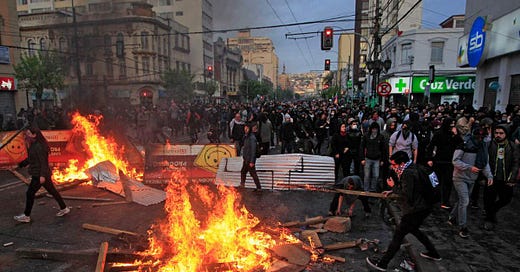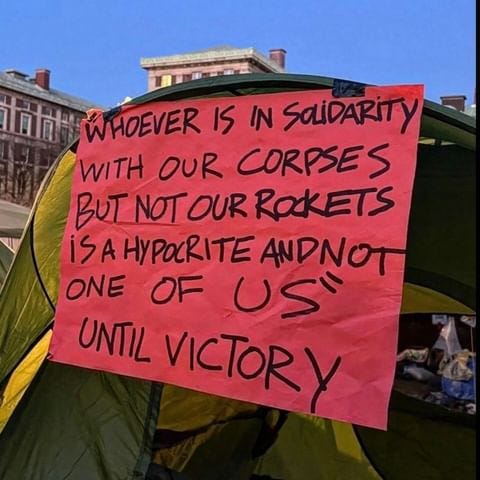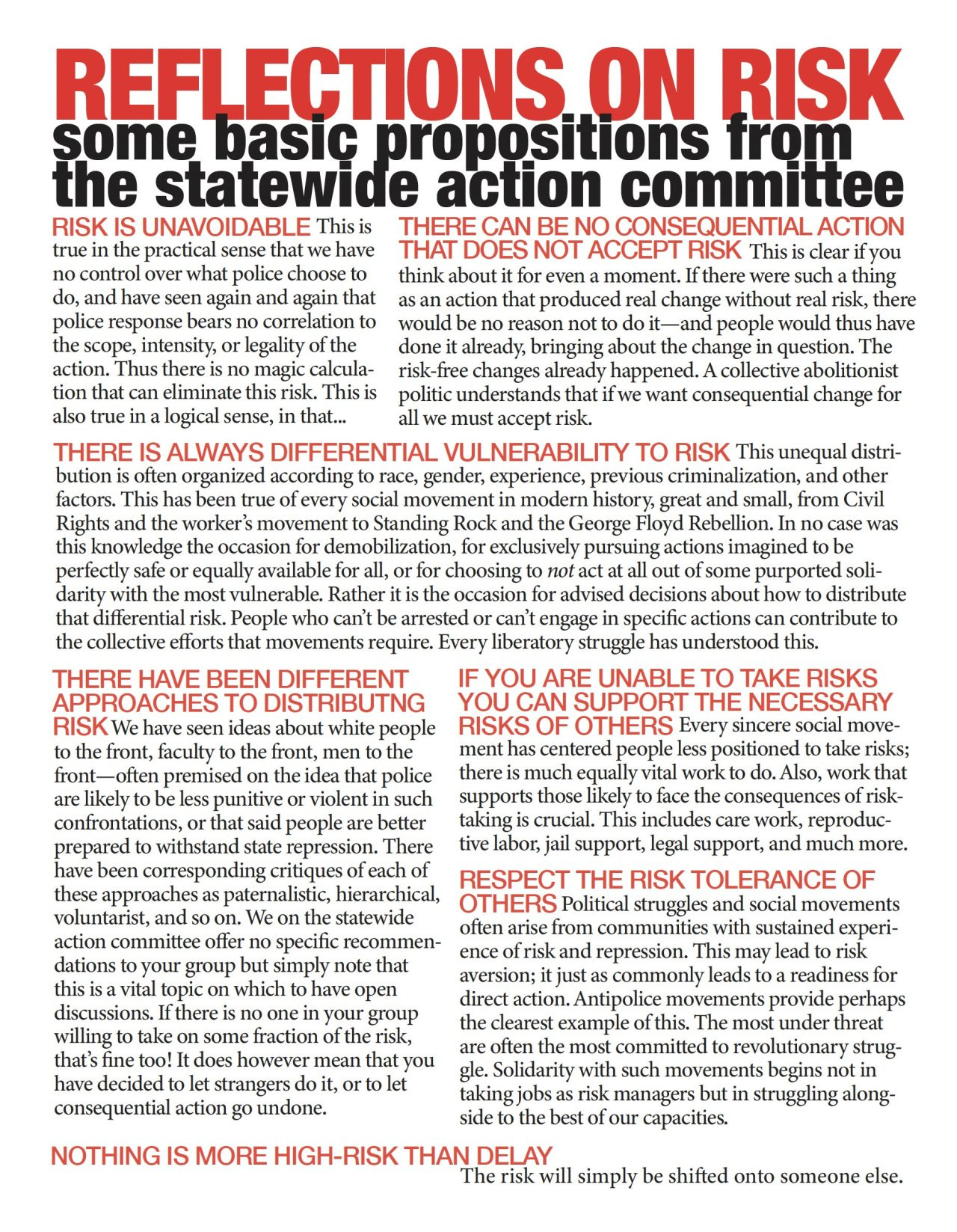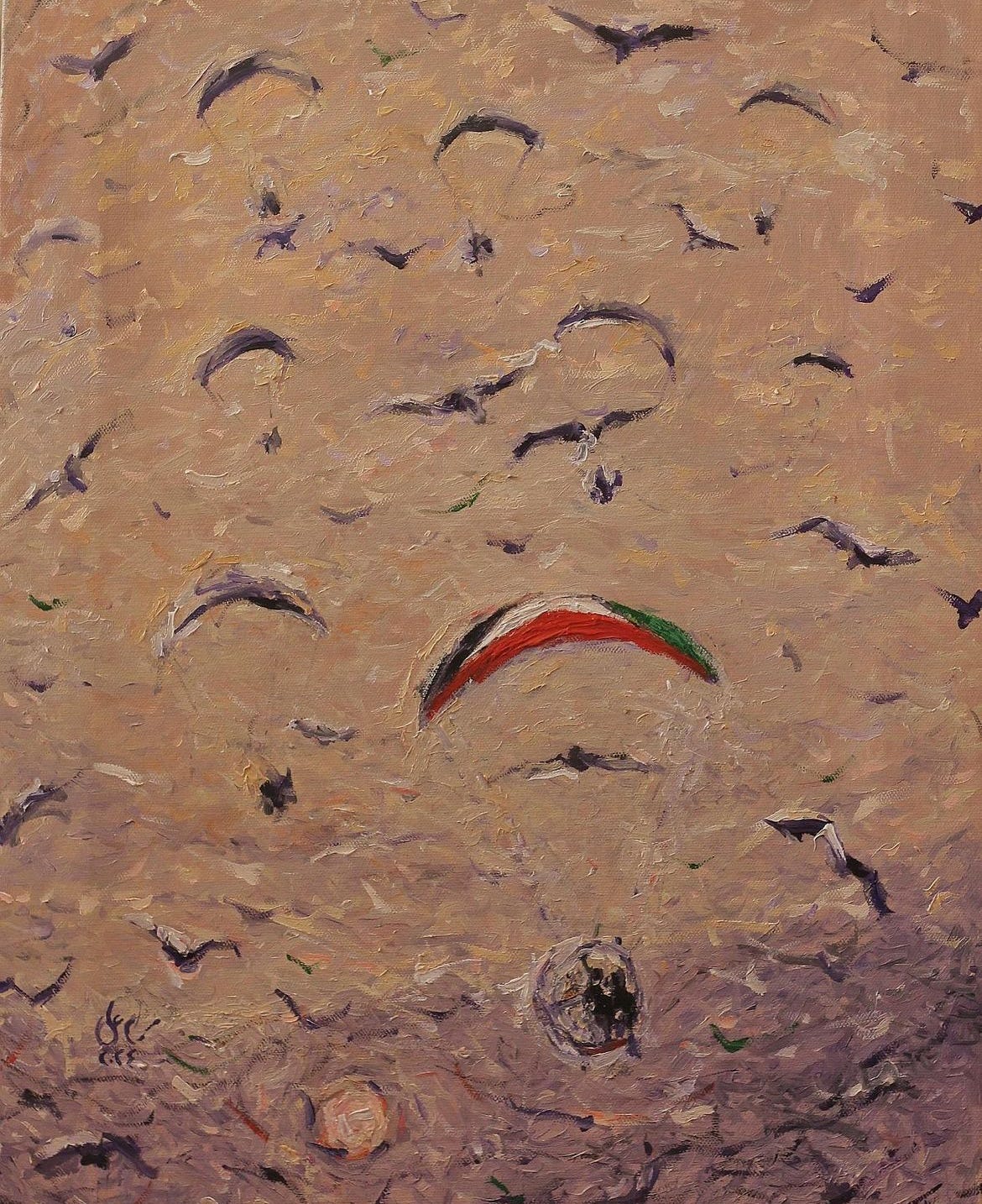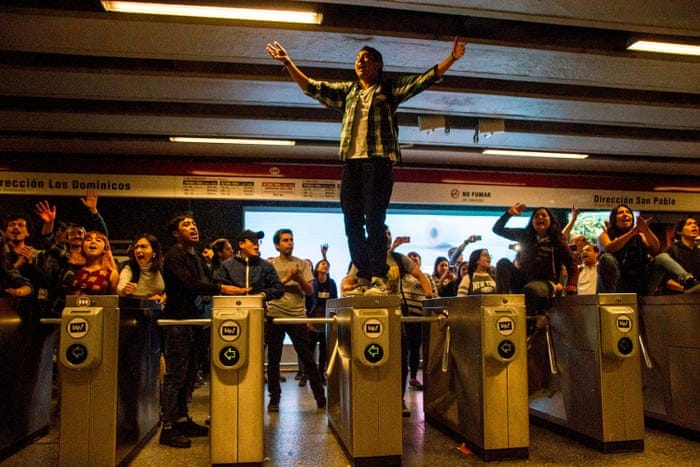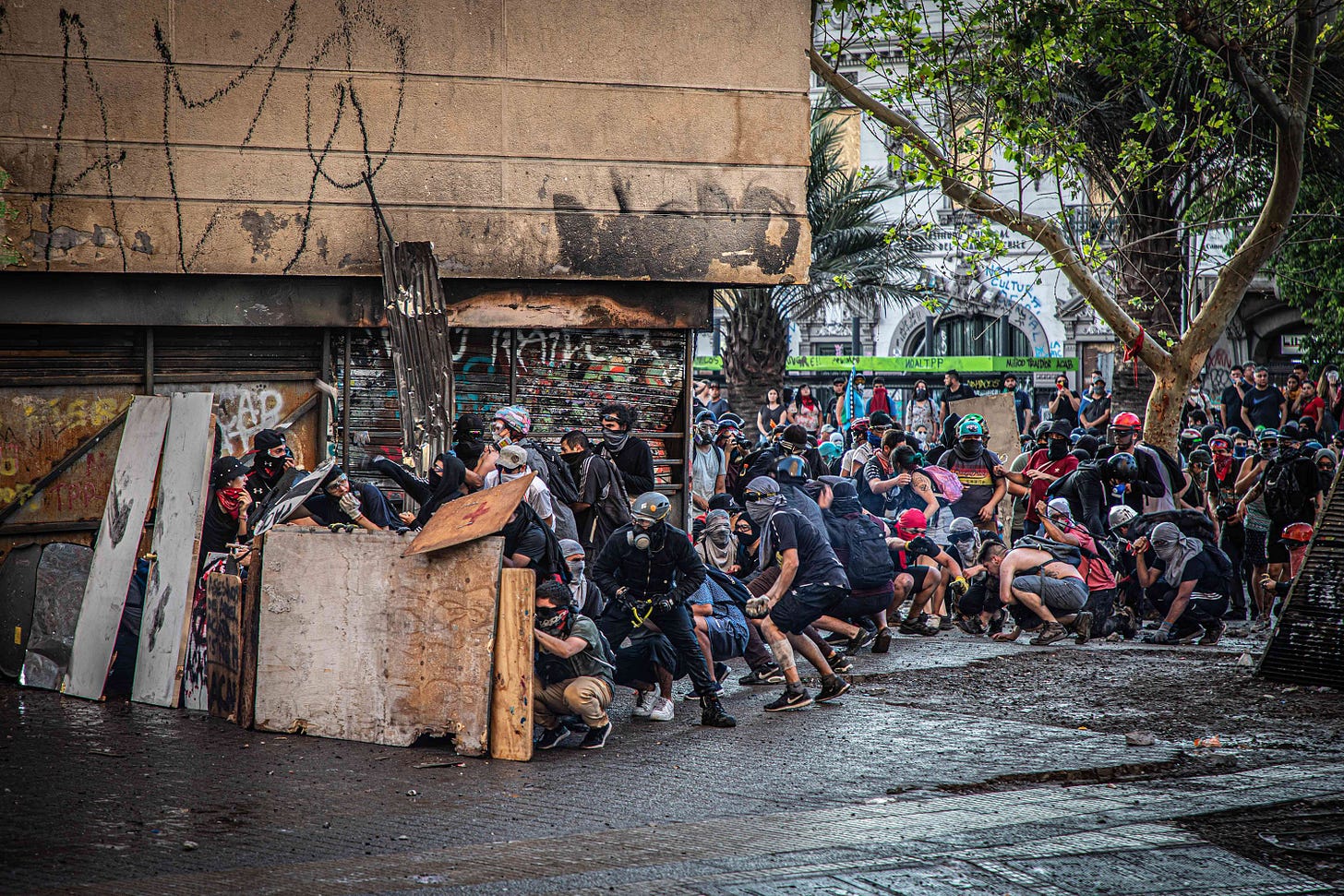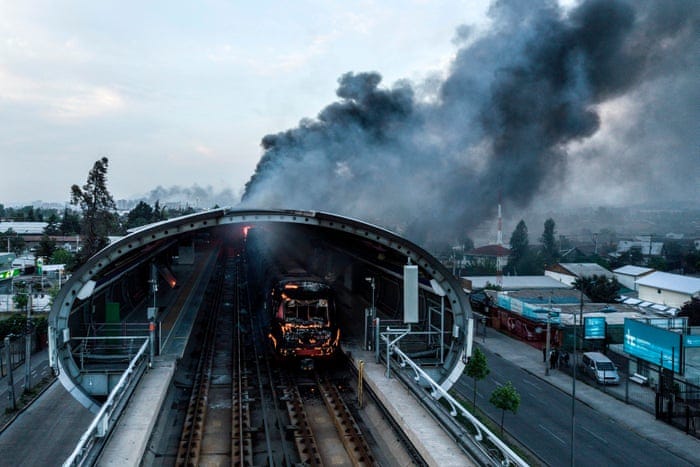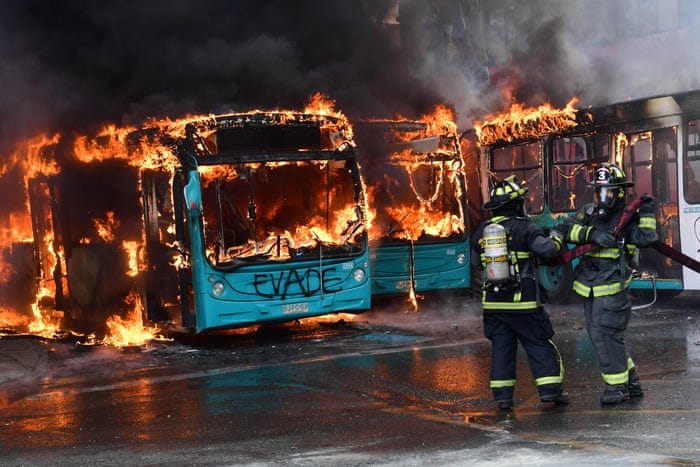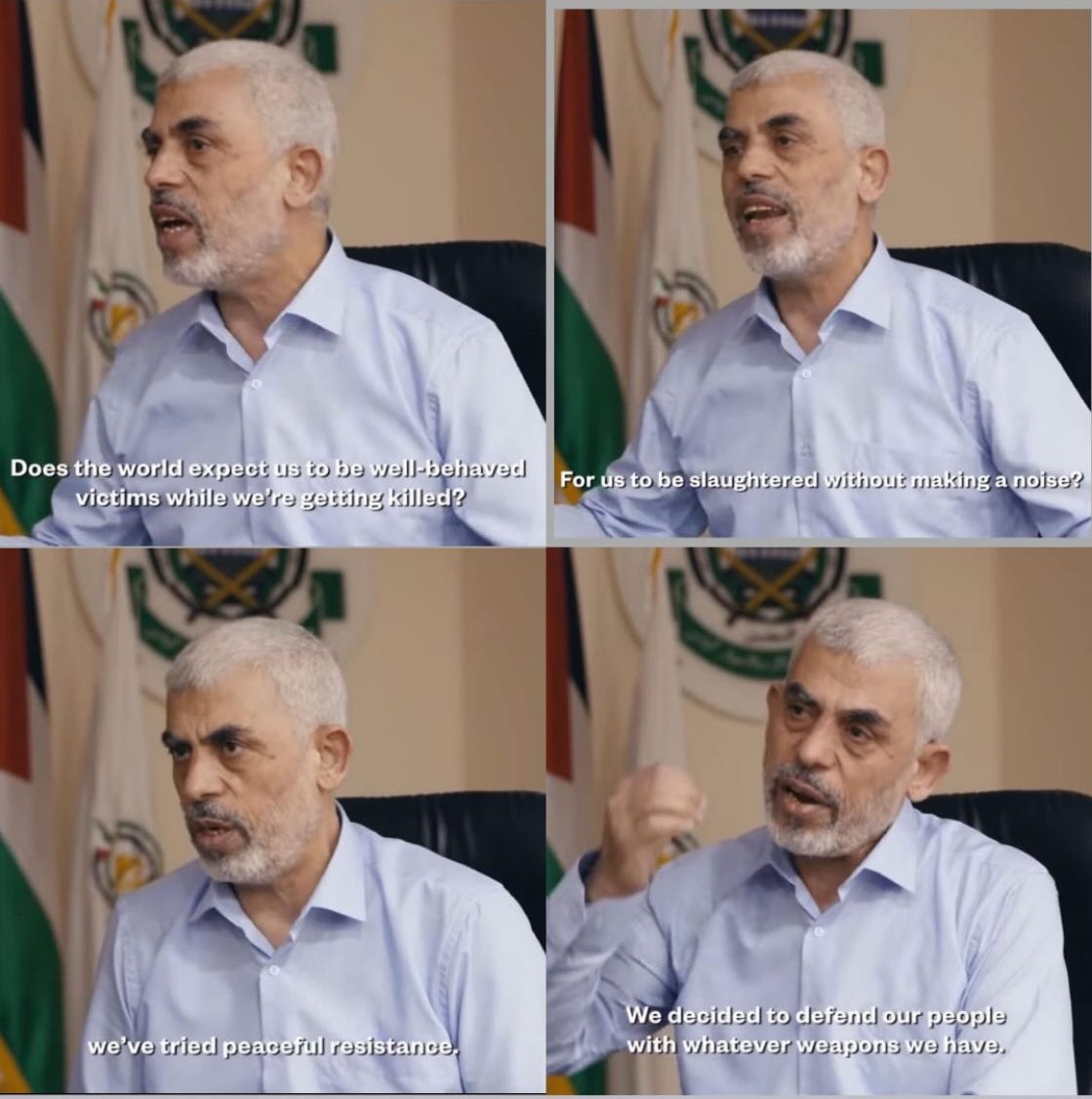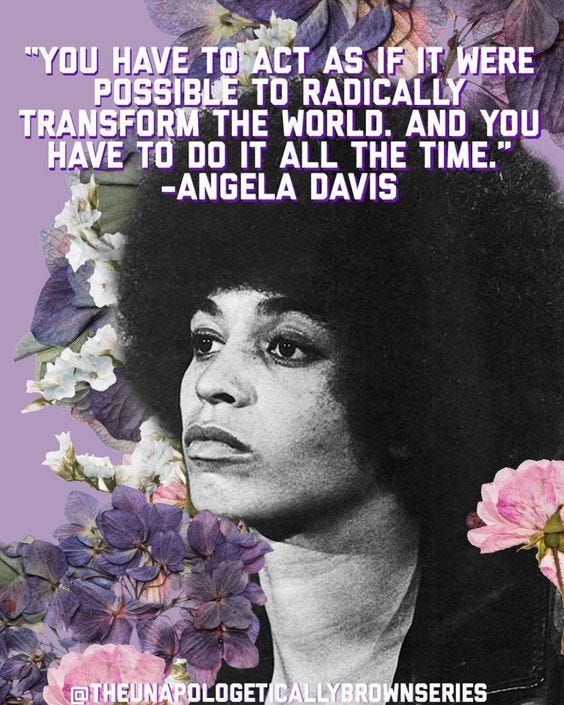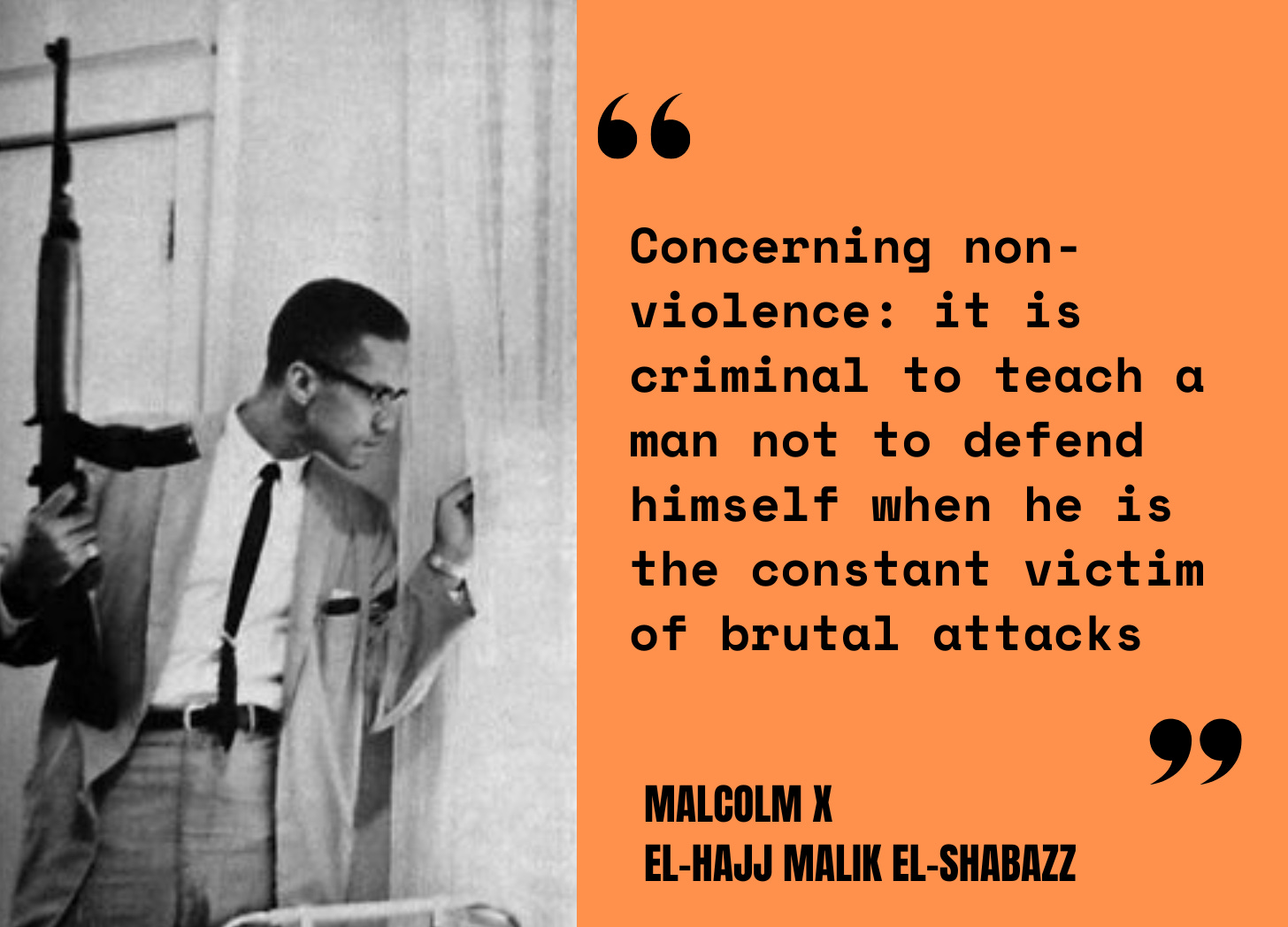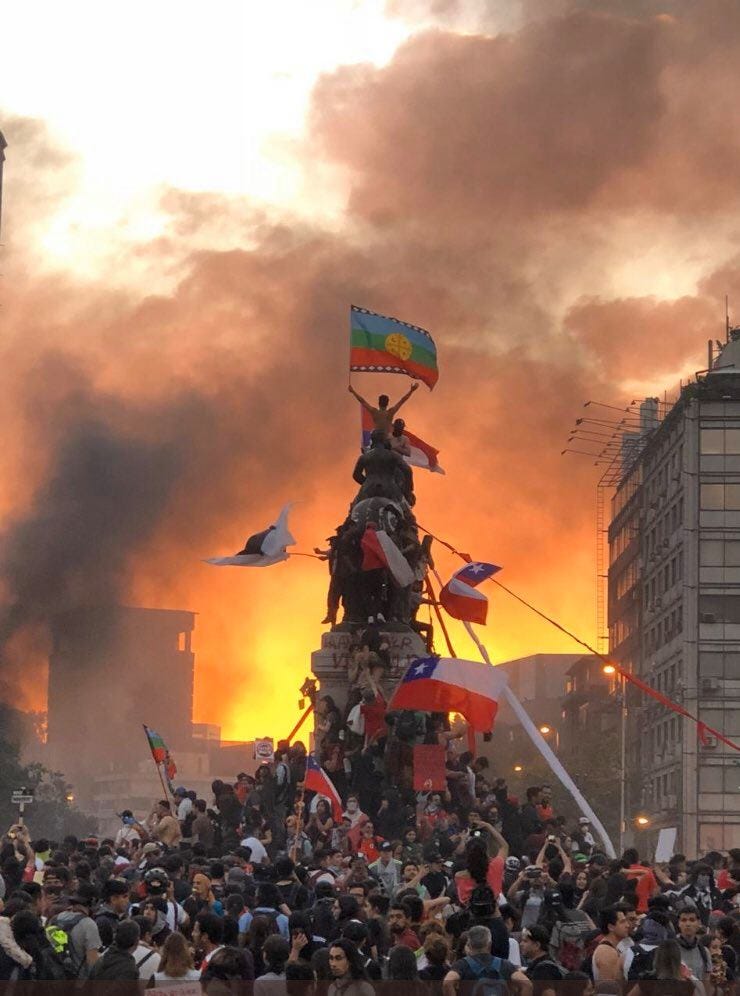We keep us safe by fighting back & taking collective risks, not by being pacifists
The misuse of "safety" jargon & why pacifism gets people killed
This piece was written in conversation with Aisha Abu-Asaba who is a Palestinian poet, care provider, co-organizer & dear friend.
What does “safety” mean in a world where people are routinely massacred, starved to death or blown to pieces? How many children died between my morning alarm & my first sip of coffee?
100 years of a brutal colonial occupation. Over 40,000 Palestinians have been martyred in the last 234 days. The more accurate number is above 100,000. The videos from Rafah— the carnage, bloodbath, inferno, beheaded babies, child screaming in anguish watching his father burn alive, people thrusting charred pieces of loved ones to the sky screaming for the world to do something — how can we not feel compelled to do more & escalate?
Endless massacres, brutality, poverty, famine, ecological disasters, rampant disease, mass extinctions, entire communities facing annihilation— & colonial/ capitalist systems are behind it all. This is our “normal”. We may be afraid to disrupt this normal. But we cannot pretend that we are safer when we refuse to take risks & fight back against the systems that are killing us.
Across history, every empire & state has eventually been dismantled by its oppressed subjects. Revolutions ARE risky. Fixating on avoiding all risk means clinging to the illusion of safety on a dying planet that is unsafe. Instead, how can we increase our capacity to take collective risks? When we think of safety thru a collectivist lens rather than an individualistic one, it is clear we are always safer when we fight back. We can attack, weaken & eventually destroy the infrastructure of the colonial empires that are killing us & the planet we call home— when we realize that some risks are worth taking. The more people that rise up to fight these systems with courage, the closer we all are to liberation.
PS: If you haven’t already, I recommend reading this piece on the “before-care” & community care infrastructure needed for effective direct action. We have to put in work to lay & till the soil. Militancy doesn’t emerge overnight & revolutions come from strong communities who have built trust, intimacy & interdependence over time. Keep that in mind as you read this piece too.
Hope & the student intifada
There are sparks of hope in the west. It feels like we’re in a watershed moment, similar to the 2020 uprisings after the brutal police murder of George Floyd. There is a noticeable shift away from symbolic protests to direct actions trying to force material change. We saw a glimpse of this on April 15 with a global wave of synchronized, coordinated yet decentralized & autonomous direct actions that targeted the economic arteries of colonial empires- from weapons manufacturers & financial corporations to shipping ports & bridges.
The most invigorating hope comes from the mass uprisings led by militant youth who escalated for Gaza with unauthorized, defiant encampments or occupied entire university buildings. Many refused to yield, make concessions or negotiate for crumbs. From Cal Poly Humboldt to UCLA, Emory, Columbia & beyond, students defended themselves and often successfully thwarted violent, armed, militarized police and zionist mobs with support from community members. The student intifada shook cities in the belly of the beast and showed westerners a glimpse of what it can look like to truly fight back— barricades, community defense tactics, innovative collective formations against police raids, de-arrest tactics & all. Repression breeds resistance.
Individualism, big egos, peace policing— internal movement threats that hold us back
This is a key moment and just like in 2020, we are observing patterns that threaten the sustainability of militant liberation movements in the west. We are yet again at risk of falling prey to the cycle of “boom and bust activism” where brief mass mobilizations are followed by burnout, disillusionment & collapse.
Multiple groups in the imperial core are experiencing the same hurdles right now. We are facing external threats like state/ police repression AND covert internal threats from within our movements.
“When a movement catches a fiery wave, pockets of people emerge who start to weaponize safety jargon to demonize those who are working toward liberation in their lifetime. These are individuals who do not have the humility to admit that they don’t actually know how safety is created. They intentionally pull people away from measured escalation by “peace policing” and fear mongering about safety protocols when they often haven’t attempted to establish proper safety (or any community) themselves. They weaponize political language & accuse people of being dangerous or harmful when there is an ask to assert some risk. A lot of people cannot imagine making serious sacrifices for someone else or letting go of their privilege. There are people who see a genocide and throw their individualism away so they can make a difference. And there are people who see an ongoing genocide and crawl deeper inside of their own comfort.” —
When these issues aren’t addressed, it breeds paranoia, mistrust, creates confusion, excessive discord & exhausts groups which can lead to the collapse of movements that had immense, transformative potential.
So here’s some key reflections on safety & risk that might help us sustain this momentum + escalate:
An effective protest or action will never be peaceful, it must be bold & disruptive. Risk is inevitable & unavoidable but it can be mitigated with collective bravery & caution.
Only the privilege can afford to act “peaceful”. Oppressive systems have never been dismantled with performative, symbolic protests. Any effective action carries inherent risk which cannot be avoided. But with community building, experience, and meticulous collective training, risk can be assessed, mitigated & managed with caution & care. Often, police repression is not correlated with the scope, intensity or legality of an action. Though, the state does disproportionately target those carrying out direct, forceful actions and that is because such disruptive actions are incredibly effective. I am willing to take certain risks because I want us to be safer. People who are risk-averse are not safer or necessarily more concerned with other people’s safety.
An individualistic, self-centered approach to “safety” is very different in practice than a collectivist approach aiming to build a safer world for all.
Just like peace or nonviolence, “safety” is a subjective term. I’m not sure pacifists are the best evaluators of risk or safety because pacifism limits their perspective & prevents them from thinking outside the box. People in the west often lack experience in basic community defense because they lack community. They lack the experience to know how to use every possible tool we can use to truly keep each other safe.
Individualism is most pervasive in the belly of the beast. People are taught to look out for themselves & seek individual safety thru competition rather than collaboration. Under capitalism/ colonialism, we’re encouraged to fixate on ourselves, hoard resources, climb the ladder, chase success & independence. Such deep conditioning doesn’t disappear in so-called leftist spaces especially not when we think we are above it all. Individualism by design biases people’s perspectives & produces behaviors that will ultimately help maintain the existing, violent status quo. The cop/ capitalist/ colonizer in our heads is fixated on rule-following risk aversion.
“Let’s rethink the way we have been strategically divided into separate pieces when we were meant to live together as one. Let’s put in some work to bring those pieces back together. Building community is learning how to protect and defend each other. We learn tactics for dearrest, stalling out the authorities in high risk situations, by practicing formations, and by sowing trust and relationship. We should become the community safety net for each other in every way - removed from reliance and trust in politicians and police. Community and trust are built when we have each other’s back, when we have constant communication, and we aren’t afraid to have difficult discussions with each other. We trust people who show their commitment through their actions, not just their words.” —
How safe we feel is proportionate to the strength of the community we have
The more community we have, the more interdependent we are, the safer & braver we feel even in the face of state violence. These systems hinge on individualism, despair & inaction. They divide, fragment & separate us from each other because they are terrified of our collective strength. Isolation incapacitates us, breeds despair & hopelessness while community & collectivism empower us to rebel. Communal safety nets make us bolder & increase our capacity to take more collective risks & fight.
Symbolic arrests should never be the ultimate goal of any action.
An action should aim to tangibly disrupt & destroy any part of the imperial death machine. I have witnessed the spectacle of symbolic arrests more in the west than anywhere else in the world. It is not necessarily a great tactic & is more rooted in widespread pacifism. Revolutionary direct action is not symbolically feeding bodies to the carceral system. We shouldn’t aspire to lose our people to the state. Arrests may happen & we should be fully prepared to weather the storm that comes with repression. If anything, building trust & intimacy, strengthening our relationships and practicing community defense tactics brings us closer together such that we are better prepared for even the worst possible outcome. However, the goal of actions should be to achieve the outcome we set to achieve and get everyone back safely so we can continue to organize relentlessly.
“Our most successful actions were covert and decentralized. Form an affinity group or cell with people you trust, and take action; when confronted by police, learn tactics to protect yourself and your comrades - barricades, de-arrest, strategic formations, and community defense (we have compiled many resources on these tactics here). As our comrades at Cal Poly wrote, "The pro-Palestinian movement must be a movement against the police." We must no longer be a sea of helpless subjects, begging for crumbs and crying foul at the bullying of the pigs. We must stop appealing to the respectability of monsters, to whom we owe nothing.”
— “Flood the Gates, Escalate!” by Palestine Action US
We are practically safer when we fight back, attack & remain on the offensive. A molotov a day keeps the cops at bay.
In the west, it may be more “normal” for people to comply, obey & submit. But when you step back to look at militant revolutionary tactics in collectivist communities around the world, it is painfully obvious that fighting back is safer than not fighting at all. I firmly believe that pacifism gets people killed. A lot of painful outcomes can be avoided if we’re bold enough to go on the offensive. Pacifism is allowing multiple genocides to go on for as long as they have.
I lived in Santiago, Chile before I moved to Nashville. In my short time, I learned more about practical community defense & effective direct action tactics in urban settings. Though careerist ex-organizers, now-politicians tried to co-opt revolutionary movements, the streets never lost their militant integrity. I lived near Plaza Dignidad which was a mass action hub. I was awestruck by the sheer numbers of people who came prepared to fight for each other. Nation-wide strikes & mass actions were organized overnight because the culture is far more collectivist. People who regularly cook, eat & sip maté at sunset together, are more equipped to fight alongside each other. It is more “normal” for people to rebel, defend each other & refuse to leave anyone behind.
Most importantly, the Chilean revolts of 2019-2020 BEGAN with people blocking major economic arteries & disrupting infrastructure— the Evasion Masiva. It started with thousands of coordinated middle & high school students refusing to pay metro fares who jumped over turnstiles & flooded the subway cars en masse.
This sparked nation-wide, spontaneous uprisings where people of all ages took to the streets of Santiago to fight the state with incredible tactical creativity & finesse. People didn’t just defend themselves. They were a decentralized, multi-faction yet unified, unpredictable, people’s army that INITIATED street battles & destroyed the material infrastructure of power.
People swarmed the city, attacked precincts, vandalized corporate offices, blocked major highways, and seized/ burnt down all major train stations. Over 100 train stations were destroyed & rendered fully inoperable with over 30 fully burnt to the ground. The extensive damage led to the collapse of the entire system & train network (the primary method of transportation) as the government announced a “state of emergency”.
A new, bold generation of front-liners (primera línea) was born that took the fight to the carabineros (the militarized national police) and moved like water to keep the state on its toes. They used every tool at their disposal— meters & meters of carefully constructed burning barricades, gas masks, hazmat suits, molotovs, flame throwers, fireworks & slingshots. The carabineros were terrified & were forcefully kept on the defensive. The brilliant tactics of the militant protestors made it very difficult for the cops to even get close to people. If the cops can’t get near you, they can’t grab you or arrest you. If the cops are scared to get near you, they’re more focused on defending themselves than arresting you. I’m willing to bet that people who have actually defended each other on the streets & fought back know a lot more about safety than someone who’s avoided confrontations with the state.
Our approach to risk & safety must be grounded in reality & contextualized in a world that is ablaze & dying. Think of what risk assessment might look like for the Palestinian resistance on the frontlines.
Palestinians are being massacred with snipers, endless missile strikes, drones & bulldozers while we bear witness. As all our eyes are on Rafah, it is being decimated & leveled to the ground with bombs made in our backyard. Our definition of “safety” & evaluation of risk must be shaped by the reality that billions of people at this very moment are dead or dying because of violent colonial/ capitalist states & systems. Someone somewhere in the world is already paying the price for our refusal to escalate. The privileged can only afford to bask in the illusion of “safety” because the most marginalized carry excessive risk. That is inequity works.
For the privileged, arrests aren’t always the death sentence that some make them out to be.
People in the west, in general, can get away with a lot more because they carry blue passports. Of course, scope of outcomes varies but our privilege is a tangible form of protection & insulation against the worst forms of colonial, state violence. It is meant to be leveraged, risked & given away. Many people who get arrested at actions continue to have jobs, pay rent & access basic survival resources. This is not understating the emotional/ psychological/ health impact of arrests but those issues can be addressed with robust community care networks. People are often more scared of breaking rules & stepping out of line than they are of the realistic consequences.
We can navigate repression effectively in community. Having hope & faith in our ability to get through hardships together makes us more resilient & powerful.
We are weaker when we are solely motivated by a fear of struggle. We are stronger when we prepare to fight as though we can & will win— it makes us more resilient, bold, & creative. Hope is ultimately a tactical advantage while despair & excessive fear/ paranoia are a disadvantage.
“I tossed out the figure of a 50% chance of going to prison. That was intentional, because I think if we are going to take big risks for a revolution, it is much healthier and more sustainable if we face up to those risks and assume the worst will come to pass. If we can imagine ourselves dealing with the consequences and surviving, prison and the police will already have lost most of their power over us. But realistically, the actual risk is closer to, and probably below, 1%, if we follow some basic security practices. Significantly, the actions that may feel the safest if we are inculcated in all the delusions of a liberal democracy, are actually the riskiest”
— Highly recommend reading Ethics, Risk & Apocalypse by
We have to learn to resist right here on the ground, not just glorify the Palestinian resistance from afar. Escalation is necessary for survival.
Palestinians on the ground cannot afford symbolic protests & know better because the settler colonial zionist entity slaughters their loved ones in front of them. That is their daily risky existence under the occupation. They cannot simply submit to police raids or pretend it is any safer than resisting & fighting back because being arrested by the IOF means brutal torture & often certain death. Armed resistance is not a choice, it is a necessity. It is deeply unethical to tell someone to NOT fight back and be polite/ peaceful/ passive in the face of snipers & missiles. It is equally unethical to let the most marginalized do all the fighting & glorify their resistance while we exempt ourselves from having to make any real sacrifices.
The world is factually extremely unsafe for the most marginalized, including those in our own backyard. Our distress & pain, even if it pales in comparison to what others face, is coming from the same empires. If some people have to take up arms & fight to resist their annihilation, then it is naive & ignorant to think that we don’t have to do the same. This is very much our fight too because our struggles are connected. It is time we geared up to fight like this our battle for collective survival. It is not “safe” to let someone else be unsafe because we’re scared to take bolder risks. Granted, collectivist communities are better equipped because their lack of a choice forced them to prepare. The sooner we start preparing & building capacity, the closer we all are to being free. Uncritical risk aversion is undoubtedly prolonging genocide, suffering & hurling us all towards a harrowing, apocalyptic, deadly future.
No good cops, no bad protestors. I’ll do a deep dive into this in the next piece.
It is understandable that some people may not want to or have the capacity to take risks. If you don’t want to be on the frontlines, you can support those who are from the sidelines or you can simply stay out of their way. It is a breech of solidarity to denounce, disavow & dox militant organizers who face enhanced surveillance & repression simply because you dislike or disagree with them.
It is time for us to step up & push each other to be brave. Courageous but cautious collective risk taking is our only shot at securing the long-term safety of our planet. There is no riskless path to liberation. It has always been time for us to escalate or focus on building the capacity to seriously escalate as though our necks are on the chopping block too. When we stick to what is “safe” by individualistic standards, we simply accept & enable the violent status quo under the guise of “safety”. But what if we dared to dream about possibilities together?
Keep reading with a 7-day free trial
Subscribe to Cosmic Anarchy to keep reading this post and get 7 days of free access to the full post archives.

